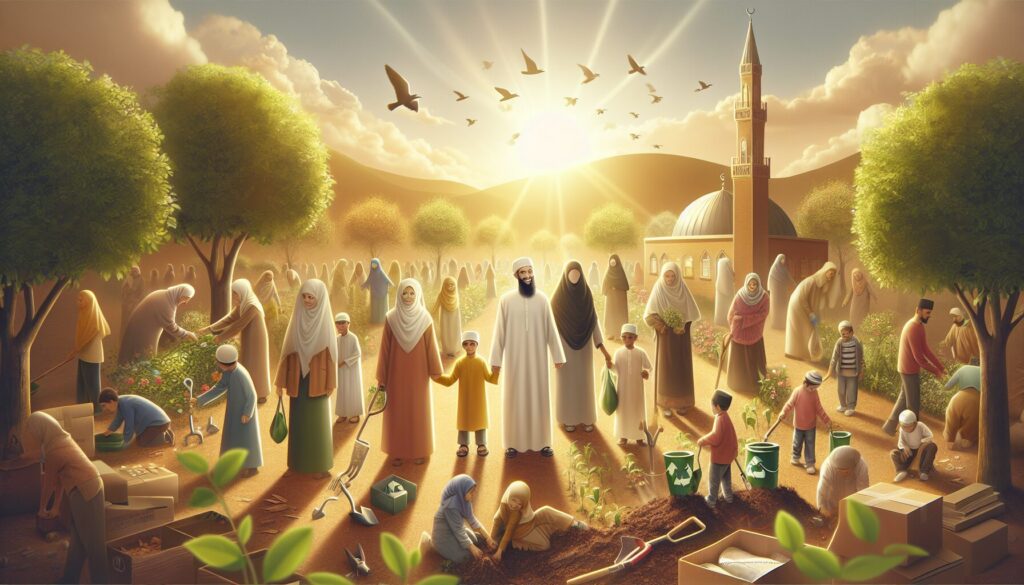Understanding the principles of Islamic environmentalism is akin to finding the key to a harmonious garden, reminiscent of my childhood visits to my grandmother’s lush garden, where she emphasized that caring for the earth is a sacred trust. This concept is central to Islamic environmentalism, portraying humans as stewards of the earth, blending spirituality with sustainability. It encourages living in harmony with nature, emphasizing the protection of all creations and avoiding wastefulness. Key principles include Khilafah, or stewardship, which involves nurturing the environment; Tawhid, recognizing the interconnectedness of all things; and Adl, ensuring fairness and balance. Additionally, Wasatiyyah promotes moderation and sustainability, aligning with modern environmental goals. These teachings provide a framework for mindful living, guiding actions like water conservation and waste reduction, and offer valuable insights for those interested in Islamic eco-activities.
Incorporating Eco-Friendly Practices in Daily Life

Making your daily routines more eco-friendly can seem daunting at first, but it’s all about small, consistent changes. Think of it like planting a garden. You start with a seed, nurture it, and watch it grow into something beautiful and beneficial. Here’s how you can incorporate eco-friendly practices into your daily life while aligning with the principles you’ve embraced.
Simple Daily Changes
Start by evaluating your daily habits. Consider how much water you use, the energy consumed by household appliances, and the waste you generate. These might seem like small things, but they can have a big impact when adjusted slightly. For example, you could replace regular bulbs with LED lights, which use less energy and have a longer lifespan.
Here are some easy steps you can take:
- Reduce: Cut down on single-use plastics. Bring your own reusable bags and bottles. This not only reduces waste but saves you money in the long run.
- Reuse: Repurpose old items instead of tossing them out. An old jar can become a plant pot or storage container.
- Recycle: Learn what can be recycled in your area by checking with local programs like Earth911 or Recycling Locator.
Each of these steps aligns with the idea of stewardship, a key aspect of Khilafah. By taking responsibility for your consumption, you’re contributing to a healthier planet.
Community Involvement
Getting involved with local groups can amplify your efforts. Participate in or even organize community clean-up events. They’re a great way to meet like-minded people and make a tangible difference. Organizations like Green Muslims or Islamic Foundation for Ecology and Environmental Sciences often have events or resources to help you get started.
Another idea is to start a community garden. It promotes biodiversity and provides fresh produce. Plus, it’s a fantastic way to bond with neighbors over a shared goal. You’re not just growing plants; you’re nurturing a sense of community while living the Tawhid principle by seeing the interconnectedness of all life.
Moreover, consider advocating for more eco-friendly practices within your workplace or school. Simple changes like starting a recycling program or reducing paper use can inspire others to join your cause. It’s amazing how one action can spark a movement, much like a single seed leads to a flourishing garden.
Incorporating these eco-friendly practices is not only about reducing harm but also about creating a positive impact. It’s about living in harmony with the earth and the principles you value, making every choice count toward a sustainable future.
Community Initiatives: Joining Islamic Environmental Groups
Imagine the joy of working hand-in-hand with like-minded individuals to make a tangible difference in the world. That’s what joining Islamic environmental groups is all about! These initiatives are popping up in communities everywhere, offering a fantastic way to dive into Islamic Eco-Activities Guide while connecting with others who share your passion for the planet.
Community initiatives are a great starting point if you’re looking to channel your enthusiasm into action. Consider joining groups like Green Muslims or Islamic Foundation for Ecology and Environmental Sciences. These organizations focus on educating and empowering communities to adopt sustainable practices that align with Islamic principles. They offer a platform for you to learn, share, and grow alongside others committed to protecting the Earth.
Getting involved in such groups can be both rewarding and fulfilling. Here are some meaningful ways you can participate:
- Attend Workshops: Many groups host workshops on sustainable living practices. You can learn about eco-friendly gardening, water conservation, and even making your own household cleaners!
- Join Clean-Up Drives: Regular community clean-up events are a staple for many organizations. Not only do they beautify the area, but they also foster a sense of community and responsibility.
- Participate in Tree Planting: Planting trees is a simple yet impactful way to contribute to environmental sustainability. It’s a rewarding experience that benefits the community and the planet.
- Volunteer for Educational Programs: Share your knowledge and passion by volunteering in educational programs that teach others about the importance of environmental stewardship.
The Joy of Collaboration
Working together towards a common goal can be incredibly motivating. When you join forces with groups like Wisdom in Nature, you’re not just engaging in eco-friendly activities—you’re building relationships and strengthening your community. Through these collaborations, you can exchange ideas, inspire each other, and create lasting change.
Furthermore, these initiatives often provide an excellent opportunity for families. If you’re a parent, consider involving your children in these activities. It’s a wonderful way to instill values of environmental stewardship from a young age. Check out our article on raising environmentally conscious Muslim children for more ideas on how to engage your family in sustainable practices raising environmentally conscious Muslim children.
By joining Islamic environmental groups, you can make a profound impact on both your local community and the broader world. It’s about taking small steps that lead to significant change, all while embracing the principles of Khilafah and Tawhid. Dive in and see the difference you can make!
Learning From Islamic Teachings on Nature and Stewardship
Understanding Islamic teachings on nature and stewardship is like unlocking a treasure chest of wisdom. These teachings offer profound insights on living harmoniously with the Earth. They emphasize our role as stewards who must nurture and protect our planet. You can see these principles in action through various eco-friendly practices inspired by Islamic teachings.
One powerful concept is the idea of stewardship, or Khilafah, which encourages us to act as responsible caretakers of the Earth. This means making choices that benefit the environment, like using energy-efficient LED lights at home or supporting sustainable agriculture. By doing so, we’re not just following religious guidance; we’re contributing to a healthier planet.
Additionally, organizations like the Islamic Foundation for Ecology and Environmental Sciences and Wisdom in Nature provide fantastic resources to deepen your understanding of these teachings. Their work helps bridge the gap between traditional knowledge and modern environmental practices. They offer practical advice for anyone looking to integrate Islamic values into their eco-activities.
Practical Steps to Embrace Stewardship
To start integrating these teachings into your life, focus on small, impactful changes. Here are a few steps to consider:
- Reduce Waste: Start by minimizing plastic use and opting for reusable products. It’s a simple yet effective way to honor the environment.
- Plant a Tree: Trees are powerful symbols of life and growth. Planting one can directly impact your local ecosystem positively.
- Support Ethical Brands: Choose companies that prioritize sustainability and ethical production. Your purchasing power can influence positive change.
Furthermore, the Islamic Eco-Activities Guide offers practical tips and activities to help you get started. It’s a fantastic resource for anyone looking to make a meaningful difference. By engaging in these activities, you’re not only following a spiritual path but also contributing to a global effort for environmental sustainability.
Remember, every small action counts. Whether it’s participating in community clean-ups, reducing your carbon footprint, or simply spreading awareness, your efforts can inspire others. By learning from the rich tapestry of Islamic teachings on nature, you’re joining a movement that values both spiritual and environmental well-being.
Creating a Personal Plan for Sustainable Living

Starting on a path of sustainable living can feel like embarking on a thrilling new adventure. It’s all about making small, meaningful changes that align with our values and beliefs. I remember my own journey when I first stumbled upon the wonders of Islamic environmentalism. It was like finding a hidden treasure chest filled with wisdom and guidance. I began by focusing on simple swaps at home, like switching to LED lights and seeking inspiration from the Islamic Foundation for Ecology and Environmental Sciences. These small steps have grown into a lifestyle that feels both fulfilling and spiritually enriching.
Creating a personal plan for sustainable living involves setting clear, achievable goals. Here’s a simple approach to get started:
- Reflect on your current habits: Start by observing your daily routines. Are there areas where you can reduce waste or energy consumption? Awareness is the first step toward change.
- Set realistic goals: Identify a few key areas where you’d like to make improvements. These could be reducing plastic use, conserving water, or supporting ethical brands.
- Incorporate Islamic principles: Utilize resources like the Wisdom in Nature to integrate your spiritual beliefs with environmental actions. This alignment will make your journey more meaningful.
- Track your progress: Keep a journal or note app to document your journey. Celebrate small victories and learn from any setbacks.
Engage With Community
Connecting with like-minded individuals can significantly enhance your sustainable living journey. Joining groups or forums that focus on Islamic eco-activities can offer you fresh ideas and support. The Islamic Eco-Activities Guide is a fantastic resource for finding community initiatives and events that align with your goals. Engaging with a community not only boosts motivation but also provides a platform to share knowledge and resources.
Furthermore, consider organizing or participating in local eco-friendly activities. Whether it’s a neighborhood cleanup, a tree-planting event, or a workshop on sustainable practices, these activities foster a sense of unity and purpose. The shared experience of working towards a common goal can be deeply rewarding and inspiring.
Remember, sustainable living is a continuous journey rather than a destination. By making intentional choices today, you’re contributing to a healthier planet for future generations. Plus, aligning these actions with your spiritual beliefs makes the journey even more significant and fulfilling.
Conclusion
Ultimately, embracing Islamic environmentalism is about integrating spiritual wisdom with sustainable actions to create a harmonious balance with nature. By adopting practices rooted in stewardship and interconnectedness, we contribute to a healthier planet while honoring our religious values. As we engage with community initiatives and make conscious lifestyle changes, we not only protect the Earth but also nurture our spiritual and communal well-being. Together, let’s continue this meaningful journey toward a sustainable future for the generations to come. Stay green and inspired!
Continue Exploring
Ready to make a positive impact on the planet while raising your little ones? Dive into practical advice with our '7 Essential Tips for Eco-Friendly Parenting' and start your journey towards a greener lifestyle today!
Frequently Asked Questions
What are the key principles of Islamic environmentalism?
Islamic environmentalism is based on principles such as Khilafah (stewardship), Tawhid (oneness of God and interconnectedness of all living things), Adl (justice and fairness), and Wasatiyyah (moderation). These principles emphasize the responsibility of humans to care for the earth, recognize the interconnectedness of all creation, maintain fairness in resource distribution, and practice moderation to prevent wastefulness.
How can I incorporate eco-friendly practices into my daily life?
Start by evaluating your daily habits and making small changes, such as reducing single-use plastics, reusing items, and recycling. You can also replace regular bulbs with energy-efficient LED lights, conserve water, and support sustainable brands. These actions align with the principle of stewardship in Islamic teachings and contribute to a healthier planet.
How can I get involved in community eco-activities that align with Islamic principles?
Consider joining Islamic environmental groups like Green Muslims or the Islamic Foundation for Ecology and Environmental Sciences. Participate in community clean-up events, tree planting, and educational workshops. Engaging in these activities not only helps the environment but also fosters a sense of community and aligns with Islamic principles of stewardship and interconnectedness.
Fatima Ansari is an Islamic educator and writer with over a decade of experience teaching Quran and Islamic studies to children and families in Western Muslim communities. Growing up in North America, she saw firsthand the challenges Muslim families face in balancing faith with modern life, which inspired her to share practical guidance rooted in the Quran and Sunnah. Her mission with E-Quran Learning is to make Islamic education accessible, relatable, and inspiring for Muslim families across the United States, United Kingdom, Canada, Australia, and New Zealand.






